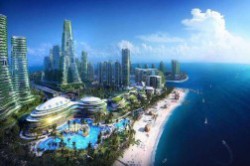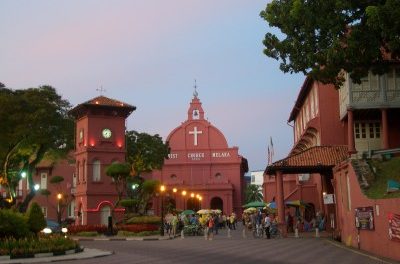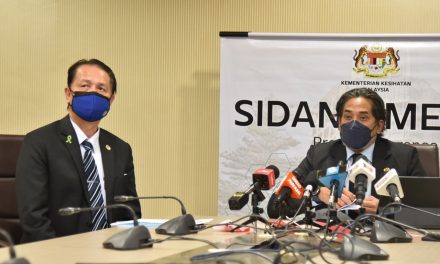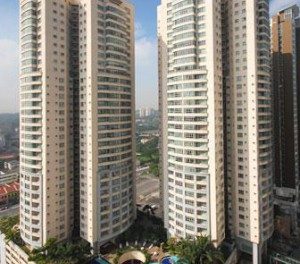RM175bil ‘Forest City’ project launched in Iskandar Malaysia
Hong Kong-listed property developer Country Garden Holdings Co Ltd launched its “Forest City” project in Iskandar Malaysia last Friday. Forest City, a lush urban getaway on four man-made islands covering over 1,386ha of land, is a joint development with Johor’s Esplanade Danga 88 Sdn Bhd. It is South-East Asia’s first and largest mixed-use green development in terms of number of units with vertical greenery and smart city design theme, as well as Country Garden’s largest real estate project outside of China. The project is expected to fuel economic development for the Iskandar region and Singapore, with 8 industries including education, healthcare and tourism as its main economic pillars of growth. Forest City is the first of the its kind mega development in South-East Asia. Phase 1 of the project will include condominiums and high-rise coastal residences which would open for global sale soon in Singapore, China and Malaysia. Its long-term plans include setting up a light rail transit system and a ferry network that would link it to Singapore and the planned high-speed rail (HSR) service. (The Star Online)
Malaysian REITs will be under pressure this year
The Malaysian real estate investment trust (REIT) sector is unlikely to be spared from the double impact of slowing global and local economic growth this year, despite relatively good results last year. REITs will face the brunt of the slowdown due to low oil prices and a weakened economy, especially in the office space segment, which has already been strained by a supply glut in recent years. Weak consumer sentiment is also likely to affect those in the retail and hospitality sector as well. However, the overall yearly dividend of local REITs will likely remain above 5.5%, and expectations of a steady hold on the overnight policy rate suggest that local REITs will remain an attractive option. (The Edge Markets)
Global Oriental, Perak MB Inc to develop RM900m mixed project
Global Oriental Bhd has signed a development rights agreement (DRA) with Menteri Besar Incorporated (Perak) (MB Inc) to develop a mixed in Manjung, Perak with a GDV of RM900 million. The parcel of land measuring 147.84 acres owned by MC Inc will be developed into a mixed project comprising commercial and residential components. Under the agreement, Global Oriental’s wholly owned subsidiary Johan Awana Sdn Bhd (JASB) will be the project developer and solely responsible for meeting the costs of the development, whereas MB Inc will be entitled to a fixed sum of RM23.59 million. The project is expected to be carried out and completed in phases over a period of 10 years with an extension of five years, subject to consent from MB Inc. (The Edge Markets)
KB Group to launch 4-star resort development in Lumut
Niche developer KB Group is planning to launch its first 4-star resort, the Ramada Lumut Resort, by end of this month. The company focuses on the hotel and hospitality property segment, and the Ramada Lumut Resort will be its second project. The 4.7-acre luxury investment property with a GDV of RM455 million comprises a 34-storey block of serviced apartments and serviced suites, plus seven exclusive forest villas. The selling price starts from RM400,000 and buyers will enjoy 7% return guarantee per year for the first three years after completion of the project, slated for end-2018. (The Malaysian Insider)
Penang-based Aspen Group wants Bursa Malaysia listing
Penang-based property developer Aspen Group says it would prefer a listing on Bursa Malaysia instead of a foreign one, despite earlier reports that it is in advance talks to list on Singapore Exchange Ltd’s (SGX) Catalist board. Group CEO Datuk Murly Manokharan said it is a Malaysian company and would prefer to list locally, and that SGX was an alternative if it was unable to comply with Bursa Malaysia’s listing requirements. (New Straits Times Online)
Slow rise in Klang Valley residential prices
According to Savills Malaysia, the Klang Valley residential market saw price growth in 3Q2015, albeit slow, as homebuyers remain cautious about the current economic and political situation. On a quarterly basis, the average price of single-storey terraced houses dropped 2.7% while two-storey terraces and high rises increased 0.73% and 2.55% respectively. Improved public transport accessibility to areas outside Klang Valley have seen buyers cashing in on properties and prompted value increases over the past five years. Year-on-year, the prices of single storey terraced houses in the Klang Valley saw stable growth — ranging from 4.2% to 27.3% — in 3Q2015. (The Malaysian Insider)
Sheda targets 90 booths at Kuching’s first Home and Property Expo
The Sarawak Housing and Real Estate Developers’ Association (Sheda) Kuching branch is aiming to have about 90 exhibitors at its first property roadshow this year. The 1st Home and Property Roadshow 2016 will be held on March 4 to 6 at Boulevard Shopping Mall. Organising chairman Alan Wong is urging exhibitors to showcase their projects and products to participate in the event. Sheda Kuching branch chairman Dr. Christopher Ngui said although the property market has remained soft at this junture, prices of properties especially residential properties will eventually increase in the future. He also noted that there is a balanced supply and demand situation in Sarawak compared to West Malaysia, and that the property market will rebound and prices will go up once the country’s economy recovers. (The Borneo Post)
UPM top eco-friendly university in Malaysia, 17th in world ranking
Universiti Putra Malaysia (UPM) has been listed among the world’s top eco-friendly universities, ranking 17th in the world under the 2015 UI-Greenmetric World University Ranking, ahead of other Malaysian and international varsities, including National University of Singapore (NUS) and University of Bath. The number 17 ranking this year a huge improvement from 41st place that UPM achieved in 2014. UPM vice-chancellor Prof Datin Paduka Dr Aini Ideris said the ranking recognised UPM’s commitment towards an eco-friendly learning space, through significant improvements in transport and infrastructure, such as increasing green spaces, use of energy-saving facilities and bicycles as means of transport within the campus. The university also organises various eco-friendly learning activities, research, co-curriculum and quality management systems. A total of 407 universities from 66 countries were included in the ranking. (The Star Online)







